Disclosure: We may earn commissions if you purchase products after clicking on a link from our site.
Conservation efforts in deer hunting are essential and very important. As part of wildlife conservation, hunters help manage populations, support wildlife balance, and fund conservation projects through licenses.
Additionally, ethical hunting practices guarantee the protection and sustainability of wildlife species. Conservation programs also tackle habitat loss, disease control, and climate issues. In this article, we discuss conservation efforts in deer hunting.
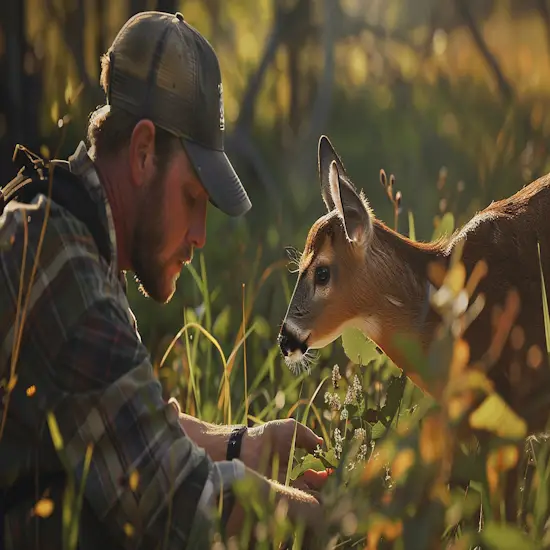
Table of Contents
Key Takeaways
- Collaborative initiatives ensure long-term deer population sustainability.
- Effective strategies focus on habitat preservation and population management.
- Educational programs promote responsible hunting practices for conservation.
- Public awareness campaigns highlight the need for deer conservation efforts.
- Combined expertise and resources safeguard deer populations for future generations.
Ethical Hunting Practices and Benefits
When hunting ethically, you show respect for the game, adhere to regulations, and follow fair chase principles. These practices bring benefits to conservation efforts by aiding in wildlife population management, maintaining ecological balance, and contributing funds through licenses and taxes.
Sustainable hunting practices play a crucial role in ensuring the well-being of wildlife populations and their habitats.
Conservation Benefits of Hunting
Conservation benefits of hunting are evident through ethical practices and contributions to wildlife habitat preservation.
- Ethical hunting promotes respect for game animals and compliance with regulations.
- Hunters aid in population management, and maintaining ecological balance.
- Financial support through licenses and taxes funds conservation efforts.
- Conservation success stories in the Midwest highlight the positive impact of hunting practices.
Hunters play an essential role in habitat preservation and wildlife management. By adhering to ethical guidelines and supporting conservation initiatives, deer hunters contribute immensely to the protection and sustainability of wildlife populations. The benefits of hunting extend beyond recreation, forming a critical part of conservation efforts for future generations.
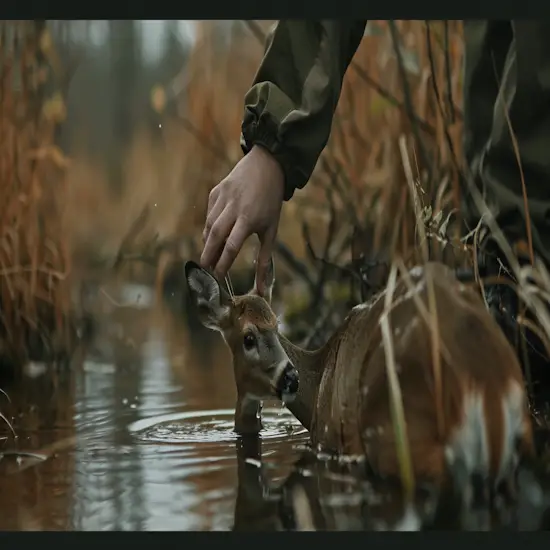
Sustainable Hunting Practices
To guarantee ethical hunting practices and maximize conservation benefits, you must adhere to regulations and demonstrate respect for wild animals. Ethical hunting involves important chase principles, compliance with laws, and appreciation for wildlife.
By following these practices, you not only secure the sustainability of hunting but also contribute to conservation efforts. Benefits of ethical hunting include maintaining ecological balance, supporting wildlife population management, and funding conservation through licenses and taxes.
Your role as a responsible hunter is essential in preserving habitats, controlling animal populations, and promoting a sustainable future of deer hunting. By engaging in ethical hunting practices, you actively contribute to the well-being of both game species and their ecosystems.
Wildlife Population Management
Consider following ethical hunting practices and embracing the benefits they offer in wildlife population management.
- By adhering to ethical hunting practices, you guarantee respect for game animals, compliance with regulations, and adherence to fair chase principles.
- Embracing these practices contributes to conservation efforts by assisting in white-tailed deer population management, maintaining ecological balance, and providing funding through licenses and taxes.
- Through ethical hunting, you actively engage in wildlife habitat preservation efforts and contribute to the success of conservation initiatives, especially in regions like the Midwest.
- The positive impacts of ethical hunting practices are evident through sustainable approaches that support long-term conservation goals while ensuring the well-being of wildlife populations.

Conservation Challenges and Initiatives
There are challenges with the conservation of wildlife such as habitat loss, fragmentation, disease control, invasive species, and climate change which affect white-tail deer hunting. However, these conservation challenges can be tackled through collaborative conservation initiatives.
Here are the key challenges faced in deer conservation efforts:
- Habitat Loss: Destruction of natural habitats reduces available land for deer populations.
- Fragmentation: Dividing habitats into smaller, isolated areas hinders deer movement and genetic diversity.
- Invasive Species: Non-native species compete with deer for resources and disrupt ecosystems.
- Disease Control: Managing diseases like chronic wasting disease is essential for population health and sustainability.
Initiatives for Conservation
To address the conservation challenges in deer management, implementing collaborative initiatives is essential for ensuring the long-term sustainability of deer populations. These initiatives involve partnerships between hunters, conservation organizations, and state agencies to tackle habitat loss, invasive species, disease control, and other pressing issues.
By working together, stakeholders can develop effective strategies for habitat preservation, research, and population management. Collaborative efforts also focus on educational programs to promote responsible hunting practices and increase public awareness of conservation needs.
Through these initiatives, hunters and conservationists can combine their expertise and resources to safeguard deer populations for future generations.
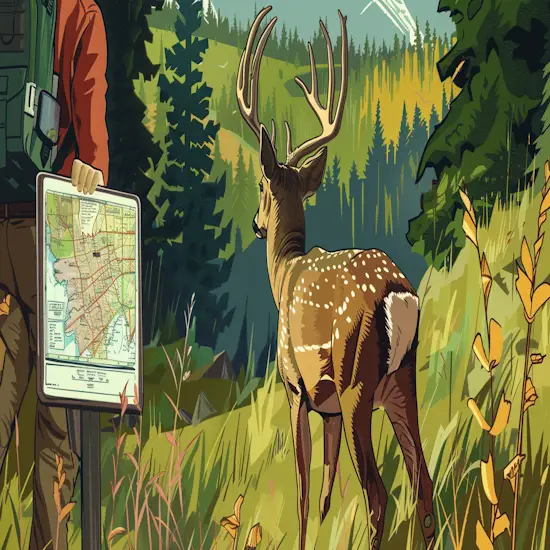
Collaborative Conservation Approaches
Collaborating with hunters, conservation organizations, and state agencies is essential for addressing the conservation challenges and initiatives in deer management effectively. To enhance collaborative conservation approaches, consider the following:
- Integrated Management Plans: Develop holistic strategies involving all stakeholders to tackle habitat loss, disease control, and climate change impacts.
- Data Sharing and Research: Foster partnerships to share information, conduct research, and implement evidence-based management practices.
- Community Engagement: Involve local communities in conservation efforts through education, outreach programs, and promoting sustainable hunting practices.
- Policy Advocacy: Work together to advocate for policies that support wildlife habitat enhancement and protection, sustainable hunting practices, and effective deer population management.

Role of Hunting Organizations in Conservation
The role of hunting organizations in conservation cannot be overstated. They advocate for wildlife habitat protection, promote sustainable practices, and contribute to policy development for wildlife management.
Additionally, hunting organizations actively engage in educational outreach, research initiatives, and policy advocacy to guarantee the sustainability of hunting practices.
Advocacy for Habitat Protection
Advocating for habitat protection, hunting organizations actively work towards preserving wildlife habitats and promoting sustainable practices.
Hunting Organizations’ Role in Habitat Protection:
- Advocacy Efforts:
- Hunting organizations lobby for policies that prioritize habitat conservation.
- Land Conservation:
- Organizations purchase land for conservation and sustainable hunting.
- Habitat Restoration:
- Initiatives focus on restoring degraded habitats to benefit wildlife.
- Educational Campaigns:
- Organizations educate the public on the importance of habitat protection for sustainable hunting practices.
Promotion of Sustainable Practices
To promote sustainable conservation practices, hunting organizations actively engage in advocating for habitat protection and educating the public on the importance of wildlife preservation. These organizations play an essential role in promoting ethical hunting practices, ensuring compliance with regulations, and emphasizing fair chase principles.
By conducting research, organizing educational outreach programs, and supporting policy development for wildlife management, hunting organizations contribute greatly to conservation efforts. They work towards fostering a deeper understanding of the benefits of hunting in maintaining ecological balance, managing wildlife populations, and generating funds for conservation through licenses and taxes.
Through their continuous efforts, hunting organizations aim to uphold responsible and sustainable hunting practices for the long-term preservation of wildlife and their habitats.

Public Perception and Awareness of Hunting
There are misconceptions about hunting and it is important to address them in shaping public perception positively. One of the steps to address misconceptions is engaging non-hunters proactively to foster understanding and appreciation for responsible hunting practices.
Additionally, promoting ethical hunting can bridge gaps between hunters and conservationists, leading to more sustainable wildlife practices.
Addressing Misconceptions Effectively
Clearing misunderstandings about hunting is essential to foster a positive outlook on conservation efforts and the role hunters play in preserving wildlife populations. To address misconceptions effectively, consider the following:
- Educational Outreach: Providing accurate information about hunting practices and conservation benefits can help dispel myths.
- Transparent Communication: Openly discussing the ethical considerations in hunting and the contributions towards wildlife management can improve public perception.
- Highlighting Conservation Success Stories: Showcasing instances where hunting has positively impacted wildlife populations and habitats can shift perspectives.
- Engaging in Constructive Dialogues: Encouraging conversations between hunters and non-hunters to understand each other’s viewpoints and find common ground on conservation goals.
Engaging Non-Hunters Proactively
To build understanding and support for wildlife conservation efforts, it’s important to engage non-hunters proactively by highlighting the positive impacts hunting has on preserving wildlife populations and habitats. By sharing how ethical hunting practices contribute to population management, ecological balance, and habitat preservation, non-hunters can gain insight into the role hunters play in conservation.
Addressing misconceptions about hunting and emphasizing the financial support provided through hunting licenses and taxes can help bridge the gap between hunters and non-hunters. Effective communication is key in showcasing the benefits of sustainable hunting practices and fostering a shared appreciation for wildlife conservation.
Engaging non-hunters in educational outreach and awareness campaigns can further promote a harmonious relationship between hunting and conservation efforts.

The Role of Hunters in Conservation
As a hunter, you play a vital role in conservation efforts through your contributions. Your impact on wildlife management is substantial, helping maintain ecological balance and sustainable practices.
Moreover, your commitment to ethical and responsible hunting practices guarantees a sustainable future for wildlife populations.
Hunters Conservation Contributions
Hunters actively contribute to conservation efforts through their financial support, volunteer work, and advocacy for sustainable wildlife management practices. This pivotal involvement plays a vital role in preserving habitats and ensuring the well-being of deer populations. Here’s how hunters make a difference:
- Financial Support: Hunters provide significant funding through license fees and taxes, which directly contribute to conservation initiatives.
- Volunteer Work: Hunters volunteer their time for habitat restoration, wildlife monitoring, and other conservation activities, actively participating in on-the-ground efforts.
- Advocacy: Hunters advocate for policies and practices that promote sustainable wildlife management, ensuring the long-term health and balance of deer populations.
- Educational Programs: Hunters engage in educational programs to raise awareness about conservation, sharing their knowledge and passion for wildlife with others.
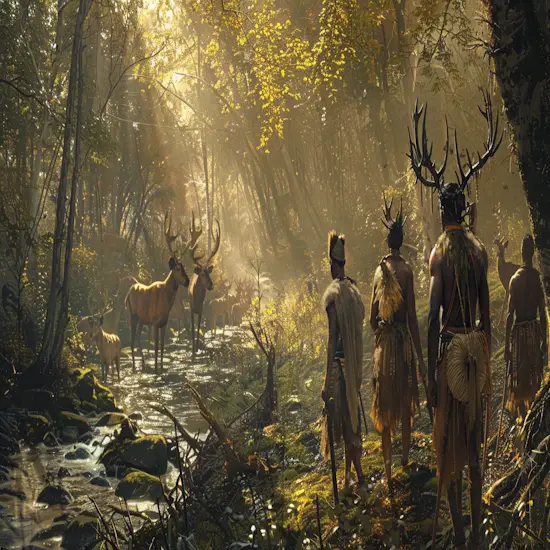
Historical Significance and Cultural Importance
White-tailed deer hold immense historical and cultural importance, having played crucial roles in North American societies for millennia.
From Native American reliance on deer for sustenance and tools to European settlers valuing them for trade, deer have been woven into the fabric of various cultures. Today, deer hunting remains a significant practice, with deep-rooted societal support for the tradition.
Cultural Significance Overview
Throughout North American history, the cultural significance of deer hunting has been deeply rooted in traditions and practices that have shaped societies and communities. Deer hunting holds immense importance for various cultural groups, influencing their way of life and values.
- Historical Necessity:
- Native Americans and European settlers heavily relied on deer for sustenance, clothing, and trade.
- Ceremonial Practices:
- Deer hunting rituals were often a central part of cultural ceremonies and rites of passage.
- Artistic Representations:
- Deer have been depicted in art, stories, and songs, symbolizing strength, grace, and survival.
- Family Traditions:
- Hunting deer has been passed down through generations, fostering bonds and preserving heritage.
Historical Conservation Contributions
Early conservation efforts driven by declining deer populations led to significant contributions to wildlife preservation and management practices. Organizations like the New York Sportsmen’s Club and the Boone and Crockett Club played pivotal roles in deer conservation.
Reintroduction initiatives, both private and state-led, were essential in restoring deer populations. Hunters played an important role in financially supporting these efforts, with the Pittman-Robertson Act generating substantial funds for wildlife management.
Additionally, hunters assisted state agencies in controlling deer populations through the implementation of various regulations and educational campaigns. The historical significance of these contributions highlights the importance of early conservation efforts in shaping the sustainable management practices that are in place today.
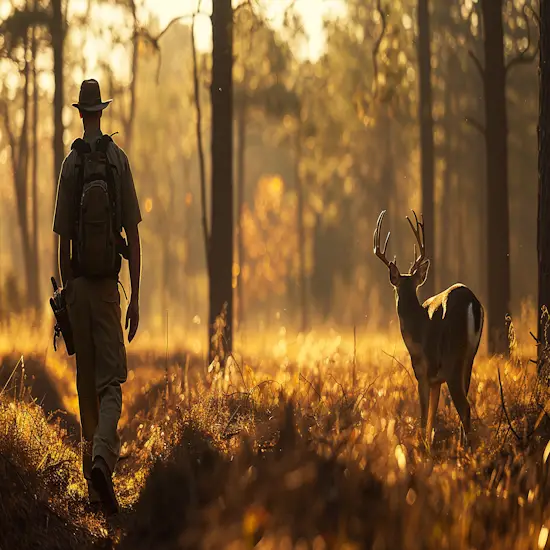
Modern Societal Perceptions
As we explore the evolution of deer conservation efforts, it’s intriguing to observe how societal perceptions of hunting have shifted over time, reflecting the historical significance and cultural importance of this practice.
Modern Societal Perceptions:
- Changing Attitudes:
- Public perception of hunting has evolved from a means of survival to a recreational activity.
- Cultural Traditions:
- Hunting for deer remains a significant cultural practice, with deep-rooted traditions in many societies.
- Ethical Considerations:
- Increasing emphasis on ethical hunting practices has influenced societal views on hunting.
- Environmental Awareness:
- Growing environmental awareness has led to a shift towards more sustainable and conservation-oriented hunting practices.
Key Conservation Organizations
Numerous conservation organizations have played pivotal roles in preserving and restoring deer populations through their historical contributions. Organizations like the National Wild Turkey Federation, Ducks Unlimited, and the Rocky Mountain Elk Foundation have been instrumental in habitat protection and enhancement. These groups have collectively enhanced millions of acres of wildlife habitats, raising significant funds through hunter contributions and volunteer efforts.
State wildlife agencies heavily rely on these organizations and hunting memberships for conservation initiatives. Their contributions are crucial in creating and protecting habitats essential for deer and other wildlife. By supporting these organizations, hunters actively participate in conservation efforts, ensuring the preservation and sustainability of deer populations for future generations.
Hunter Contributions Today
Contribute actively to the conservation and historical preservation efforts of hunters today. Here’s how you can make a difference:
- Engage in Habitat Preservation: Participate in habitat restoration projects and advocate for the protection of wildlife habitats.
- Support Conservation Organizations: Join or donate to organizations dedicated to wildlife conservation to amplify your impact.
- Promote Sustainable Hunting Practices: Follow ethical hunting guidelines, adhere to regulations, and educate others on responsible hunting.
- Participate in Data Collection: Report harvested animals, participate in deer census efforts, and contribute to research initiatives for better deer management.
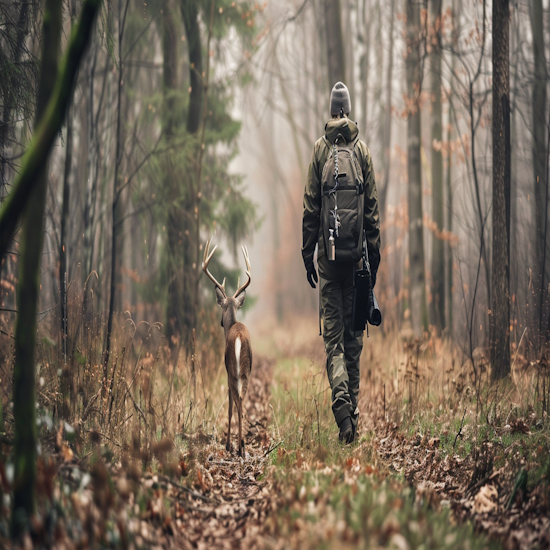
Economic Impact and Value of White-Tailed Deer
When you consider the economic impact and value of white-tailed deer, think about the billions spent by big game hunters in the U.S. on deer hunting, which supports numerous jobs. This substantial economic value of deer has both positive and negative impacts on various sectors, contributing heavily to local economies.
Economic Contributions From Hunting
Hunting for white-tailed deer has a substantial impact on the economy through billions of dollars spent by big game hunters in the U.S. This economic contribution supports numerous jobs, boosts local economies, and directly funds state wildlife agencies.
The economic value of deer hunting is undeniable, with revenue from hunting license fees playing a significant role in conservation efforts. Here is a breakdown of the economic contributions from hunting:
- Big game hunters in the U.S. spent billions on deer hunting activities.
- Revenue from hunting license fees directly supports state wildlife agencies.
- Deer hunting results in a transfer of income from cities to rural communities.
- Hunters play a key role in the economic value of deer through their activities and financial support.
Local Community Benefits
The economic value of white-tailed deer hunting in the U.S. greatly impacts local communities through various financial channels. Big game hunters spending billions on deer hunting support numerous jobs, contributing markedly to rural economies. Revenue from hunting license fees directly supports state wildlife agencies, aiding in conservation efforts.
Deer hunting serves as an essential source of income for rural communities, transferring funds from urban to rural areas. Hunters play a substantial role in boosting the economic value of deer through their activities and financial support. This financial infusion benefits local businesses, from lodging and restaurants to hunting gear suppliers, creating a ripple effect that sustains community growth and development.
The Bottom Line
As you reflect on the intricate dance between hunters and conservation, remember that they’re the protectors of our natural world, ensuring the delicate balance of ecosystems. Hunters play a crucial role in preserving wildlife habitats and managing deer populations.
In this article, we discussed conservation efforts in deer hunting. Hunters work with wildlife agencies, hunting organizations, and local communities for the conservation of wildlife.
If you would like to enhance your deer hunting skills, then you an read this article on the best whitetail deer hunting tips. Additionally, you can also learn how to properly camouflage yourself while hunting by reading camouflage techniques for deer hunting.
